上海牛津版英语六年级第一学期6A期末复习知识点总结
上海牛津版英语六年级第一学期6A期末复习知识点总结
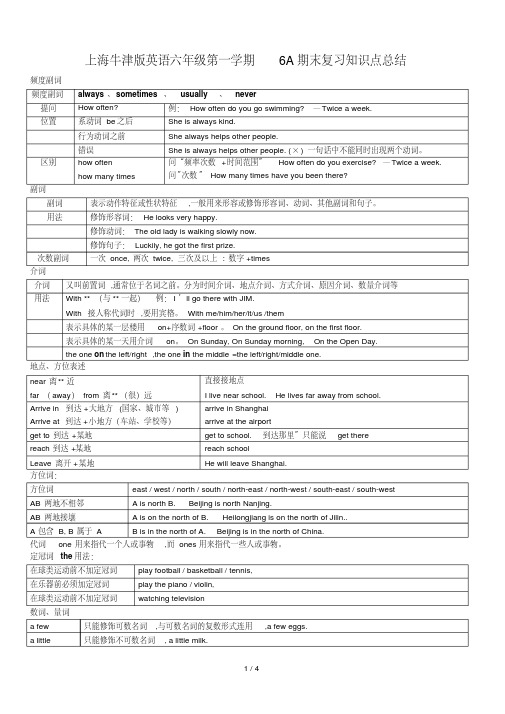
上海牛津版英语六年级第一学期6A 期末复习知识点总结频度副词副词介词地点、方位表述near 离**近far (away )from 离**(很)远直接接地点I live near school. He lives far away from school. Arrive in 到达+大地方(国家、城市等) Arrive at 到达+小地方(车站、学校等)arrive in Shanghai arrive at the airport get to 到达+某地get to school. 到达那里”只能说get therereach 到达+某地reach schoolLeave 离开+某地He will leave Shanghai.方位词:方位词east / west / north / south / north-east / north-west / south-east / south-west AB 两地不相邻 A is north B.Beijing is north Nanjing.AB 两地接壤 A is on the north of B. Heilongjiang is on the north of Jilin.. A 包含B, B 属于 A B is in the north of A.Beijing is in the north of China.代词one 用来指代一个人或事物,而ones 用来指代一些人或事物。
定冠词the 用法:在球类运动前不加定冠词play football / basketball / tennis, 在乐器前必须加定冠词play the piano / violin, 在球类运动前不加定冠词watching television数词、量词a few 只能修饰可数名词,与可数名词的复数形式连用,a few eggs.a little只能修饰不可数名词, a little milk.频度副词always 、sometimes 、usually、never提问How often? 例:How often do you go swimming? —Twice a week. 位置系动词be 之后She is always kind.行为动词之前She always helps other people.错误She is always helps other people. (×) 一句话中不能同时出现两个动词。
上海版牛津英语6A知识点整理
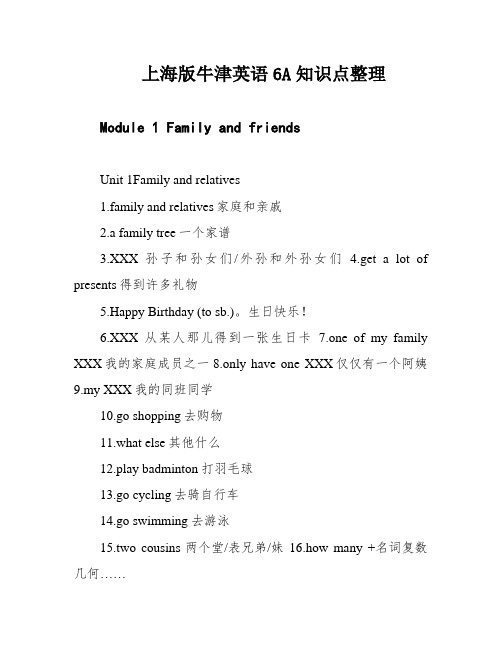
上海版牛津英语6A知识点整理Module 1 Family and friendsUnit 1Family and relatives1.family and relatives家庭和亲戚2.a family tree一个家谱3.XXX孙子和孙女们/外孙和外孙女们4.get a lot of presents得到许多礼物5.Happy Birthday (to sb.)。
生日快乐!6.XXX从某人那儿得到一张生日卡7.one of my family XXX我的家庭成员之一8.only have one XXX仅仅有一个阿姨9.my XXX我的同班同学10.go shopping去购物11.what else其他什么12.play badminton打羽毛球13.go cycling去骑自行车14.go swimming去游泳15.two cousins两个堂/表兄弟/妹16.how many +名词复数几何……语言点1.This is my XXX.这是我的(外)祖父。
These are my family and relatives.这些是我的家人和亲戚。
留意句中各身分坚持单复数同形。
2.I‟m their son。
我是他们的儿子。
We‟re their sons.我们是他们的儿子。
3.How many uncles do you have?你有几何个叔叔?How many背面接可数名词的复数方式。
4.What do you do with your…?你和你的…干什么?5.What else do you do with your…?你和你的…还干什么?6.What else do you do with your…?你和你的…还干甚么?With是个介词,背面接人称代词时,要用宾格的形式。
With me/him/her/it/us /them7.always/sometimes/usually是频度副词,发问应当要用How often…?Unit 2I have a good friend1.help each other互相帮助2.help other people = help XXX匡助他人3.not…at all根本不4.go out at night在早晨进来5.like to be XXX喜欢在一起6.XXX7.be friendly8.XXX9.work hard = study hard10.be late for school11.get angry12.be kind to others13.XXX.14.XXX15.XXX16.a visit to sp.17.live in the USA = live in America18.visit sp。
牛津沪教版六年级上6AUnit1-Unit2重要知识点复习
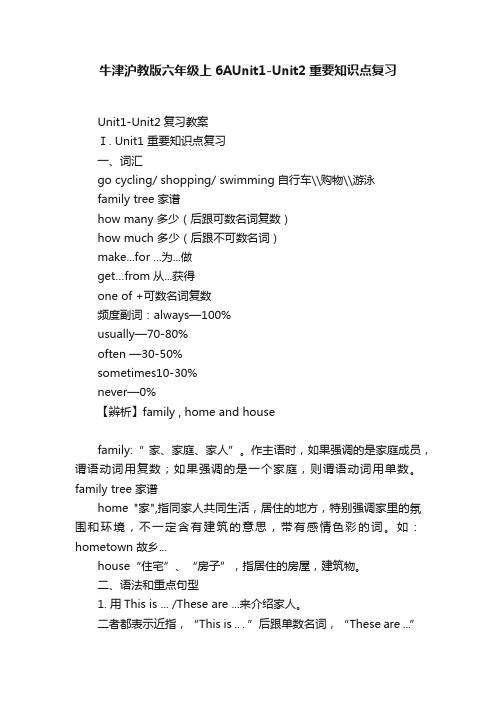
牛津沪教版六年级上6AUnit1-Unit2重要知识点复习Unit1-Unit2复习教案Ⅰ. Unit1 重要知识点复习一、词汇go cycling/ shopping/ swimming自行车\\购物\\游泳family tree 家谱how many 多少(后跟可数名词复数)how much 多少(后跟不可数名词)make...for ...为...做get…from从...获得one of +可数名词复数频度副词:always—100%usually—70-80%often —30-50%sometimes10-30%never—0%【辨析】family , home and housefamily:“ 家、家庭、家人”。
作主语时,如果强调的是家庭成员,谓语动词用复数;如果强调的是一个家庭,则谓语动词用单数。
family tree 家谱home "家",指同家人共同生活,居住的地方,特别强调家里的氛围和环境,不一定含有建筑的意思,带有感情色彩的词。
如:hometown 故乡...house“住宅”、“房子”,指居住的房屋,建筑物。
二、语法和重点句型1. 用This is ... /These are ...来介绍家人。
二者都表示近指,“This is .. . ”后跟单数名词,“These are ...”后跟复数名词或者多个不同的对象。
2.用how many 来询问数量后接可数名词的复数形式,当我们提问你有多少……时候,如果How many后跟人,常用how many... do you have?如果How many 后跟物,常用how many...have you got?3.What do you do with your... ? 和What else do you do with your... ? 来提问与家庭成员或亲戚一起做什么.else 意为别的其他的,常用于特殊疑问词或不定式之后,如what else, something else等。
牛津沪教版六年级上6A-Unit 1 知识点梳理 + 拓展阅读

6A Module 1 Family and friendsUnit 1 Family and relatives知识点梳理I. Useful words and expressions1. family与relativesfamily通常指自己的父母、兄弟姐妹等成员。
Relatives指的是除此之外与自己有血缘关系或非血缘关系的亲属。
2. 中英家庭称谓区别grandfather: 祖父,外祖父;grandmother: 祖母,外祖母;uncle: 叔父,舅舅,姨夫,姑父;aunt: 姑姑,姨母,婶婶,舅母;cousin: 堂兄弟姐妹,表兄弟姐妹;3. Alice has got a lot of presents and birthday cards from her family and relatives.a lot of 许多大量,后面加可数名词复数或不可数名词,相当于lots of。
get sth. from sb.: 从某人那里得到某物。
4. These are my uncles and this is my aunt.在介绍人物时,常用this is或these are这种句型,而不用使用he/she is, they are句型。
5. – Alice, what do you do with your aunt? – I usually go shopping with my aunt.问句中出现的第一个do是助动词,用于对实意动词的一般疑问句提问,其否定句形式是don’t。
同样作用的助动词还有does和did。
go shopping 去购物。
动词go后面跟动词时,常常接动词的-ing形式。
e.g., go swimming去游泳go cycling去骑车go fishing去钓鱼go camping去野营6. I always play football with my father.动词play后直接跟球类运动时,不需要加定冠词the。
牛津沪教版六年级上6AUnit1-Unit2 重要知识点复习
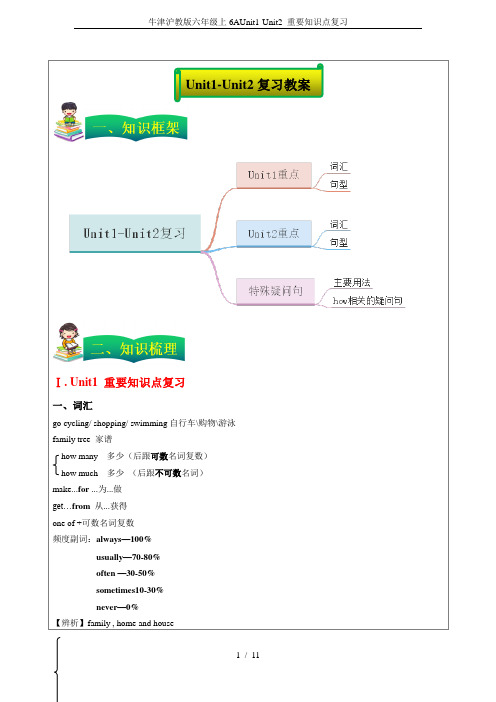
Unit1-Unit2复习教案Ⅰ. Unit1 重要知识点复习一、词汇go cycling/ shopping/ swimming自行车\购物\游泳family tree 家谱how many 多少(后跟可数名词复数)how much 多少(后跟不可数名词)make...for ...为...做get…from从...获得one of +可数名词复数频度副词:always—100%usually—70-80%often —30-50%sometimes10-30%never—0%【辨析】family , home and housefamily:“ 家、家庭、家人”。
作主语时,如果强调的是家庭成员,谓语动词用复数;如果强调的是一个家庭,则谓语动词用单数。
family tree 家谱home "家",指同家人共同生活,居住的地方,特别强调家里的氛围和环境,不一定含有建筑的意思,带有感情色彩的词。
如:hometown 故乡...house“住宅”、“房子”,指居住的房屋,建筑物。
二、语法和重点句型1. 用This is ... /These are ...来介绍家人。
二者都表示近指,“This is .. . ”后跟单数名词,“These are ...” 后跟复数名词或者多个不同的对象。
2.用how many 来询问数量后接可数名词的复数形式,当我们提问你有多少……时候,如果How many后跟人,常用how many... do you have?如果How many 后跟物,常用how many...have you got?3.What do you do with your... ? 和What else do you do with your... ? 来提问与家庭成员或亲戚一起做什么.else 意为别的其他的,常用于特殊疑问词或不定式之后,如what else, something else等。
A上海牛津英语六年级第一学期重点词组和句型
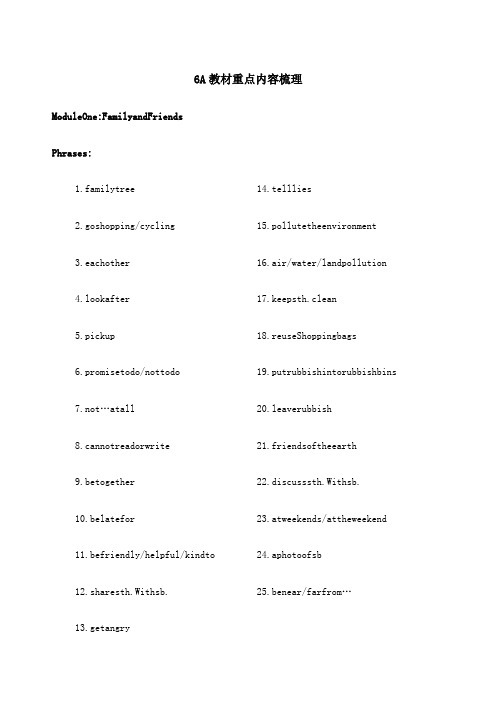
6A教材重点内容梳理ModuleOne:FamilyandFriendsPhrases:1.familytree2.goshopping/cycling3.eachother4.lookafter5.pickup6.promisetodo/nottodo7.not…atall8.cannotreadorwrite9.betogether10.belatefor11.befriendly/helpful/kindto12.sharesth.Withsb.13.getangry 14.telllies15.pollutetheenvironment16.air/water/landpollution17.keepsth.clean18.reuseShoppingbags19.putrubbishintorubbishbins20.leaverubbish21.friendsoftheearth22.discusssth.Withsb.23.atweekends/attheweekend24.aphotoofsb25.benear/farfrom…26.havelunch/dinner/apicnic/abar becue27.flykites 28.ridebicycles29.makesandcastles30.collectshellsSentencepatterns:1.A:Howmanybrothers/…doyouhaveB:I(only)haveonebrother.2.A:whatdoyoudowithyour…B:Ialways/usually/sometimesplaygameswith….A:Whatelsedoyoudowithsb.B:Isometimes…with…3.A:Haveyoubeento…B:Ihavejust/alreadybeento…/there./Ihaven’tbeento…/thereyet.4.Whatabout/Howabout+n./ving…5.A:WhatdoyouusuallydoatweekendsB.Iusually…6.A:Is…nearorfarawayfrom…B.Itisnear/farawayfrom….7.A:Wherehaveyoubeen8.B:Ihavebeento….9.Whichplaceshallwevisit10.Whenshallwegothere11.Whattime12.Whenarewegoingtocomeback13.Howarewegoingtogetthere14.Howmuchdoesitcost ModuleTwo:PlacesandActivities Phrases:1.abankclerk2.ashopassistant3.putoutfires4.cookfood5.makeourcityasafeplace6.lookat7.listento8.arriveat9.havetea10.attheentrance11.ontheground/firstfloor12.ontheopenday13.athalfpasteightinthemorning14.First,../Next,…/Then,…/Afte rthat,…/Finally,…15.takephotos16.byferry/byunderground/onfoot17.onthebus18.gotoschool19.alotof/some/afew20.livenear/farawayfromschool21.anadvertisementboard22.lightrail 23.adepartmentstore24.ahousingestate25.apolicestation26.halfanhour27.waitfor28.walkonthegrass29.keepquiet30.runacrosstheroad31.picktheflowers32.turnleft/right33.ontheright/left34.inthemiddle35.goupstairsSentencepatterns:1.A:Wouldyouliketobea/an…B:Yes,Iwould.//No,Iwouldn’t.A:Why/WhynotB:Iwould/wouldn’tliketobea/an…becauseI…2.A:WhatwouldyouliketobeB:Iwouldliketobe…3.A:Doyoulivenearorfarawayfrom…B:Ilivenear/farawayfrom….A:HowdoyougotoschoolB:Igotoschoolby…/onfoot.A:HowlongdoesittakeB:Ittakes…4.A:Howlongdoesittakeyoutogetto…B:Ittakesmeabout…togetthere.5.A:WhatdoesSimonseewhenheiswalkingtoschoolB:Simonsees...whenheiswalkingtoschool.6.Whatdoesthissignmean7.Wemustnoteatordrink./Don’teatordrink.8.Wemust…9.A:WhichescalatormustweuseB:Wemustusetheoneinthemiddle. ModuleThree:FoodandDrinkphrases1.friedcabbage/chickenwings2.steamedprawnswithgarlic3.boiledeggs4.ashoppinglist5.atthevegetablestall6.inthefrozenfoodsection7.inthemarket/supermarket8.haveapicnic9.abottleofjam 10.apacketofnuts11.aslice/slicesof12.anunhealthydiet13.doexercise14.liveinthecountryside15.staywithsb.16.plentyof/alotof17.alittle/some18.myfavouritebreakfast19.toomuchspicyfood20.eatinghabits21.thefoodpyramid Sentencepatterns:1.A:WhatwouldyoulikefordinnertonightB:I’dlike…fordinner.A:Whatkindof…wouldyoulikeWouldyoulike…or…B:I’dlike…2.A:Haveyouboughtany…B:Yes,I’veboughtsome…A:Wheredidyoubuyit/themB:Inthemarket,atthe…stall/inthe…section.A:Howmuchwasit/weretheyB:Itwas/Theywere…yuan.3.A:ShallwebuysomesoftdrinksB:Ok./That’sagoodidea.4.Let’sbuysomebreadandabottleofjam.Let’sgotothesupermarkettobuysomefoodanddrinkforthepicnic.5.A:Wouldyoulikesome…B:No,thanks/yes,please6.A:Whydoyoulike…B:Ilikeit/thembecauseit’s/they’resweet/delicious/tasty/spicy. 7.A:WhynotB:Idon’twant…becauseitistoo….8.A:MayIhavesome…,pleaseB.Ok/Sure/Allright/Yes,youmay.Hereyouare.//NO,youmaynot./I’mafraidyoucan’t..9.A:HowmuchsugardoweneedeverydayB:Weneedalittlesugareveryday.10.A:Whichonewashealthier/lesshealthyB:…’sdietwashealthierthan/lesshealthythan/ashealthyas/asunhealth yas…’sdiet.11.Howmuch…doweneed12.Whatdoyouusuallyhaveforbreakfast/lunch/dinner13.A:Whatdidyouhaveforbreakfastyesterday。
上海牛津6年级第一学期知识点总结梳理
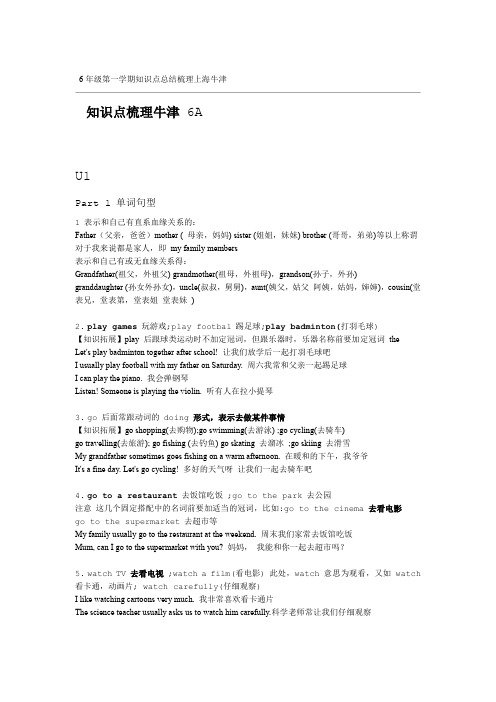
6年级第一学期知识点总结梳理上海牛津知识点梳理牛津6AU1Part 1 单词句型1 表示和自己有直系血缘关系的:Father(父亲,爸爸)mother ( 母亲,妈妈) sister (姐姐,妹妹) brother (哥哥,弟弟)等以上称谓对于我来说都是家人,即my family members表示和自己有或无血缘关系得:Grandfather(祖父,外祖父) grandmother(祖母,外祖母),grandson(孙子,外孙)granddaughter (孙女外孙女),uncle(叔叔,舅舅),aunt(姨父,姑父阿姨,姑妈,婶婶),cousin(堂表兄,堂表第,堂表姐堂表妹)2.play games 玩游戏;play footbal 踢足球;play badminton(打羽毛球)【知识拓展】play 后跟球类运动时不加定冠词,但跟乐器时,乐器名称前要加定冠词theLet's play badminton together after school! 让我们放学后一起打羽毛球吧I usually play football with my father on Saturday. 周六我常和父亲一起踢足球I can play the piano. 我会弹钢琴Listen! Someone is playing the violin. 听有人在拉小提琴3.go 后面常跟动词的doing 形式,表示去做某件事情【知识拓展】go shopping(去购物);go swimming(去游泳) ;go cycling(去骑车)go travelling(去旅游); go fishing (去钓鱼) go skating 去溜冰;go skiing 去滑雪My grandfather sometimes goes fishing on a warm afternoon. 在暖和的下午,我爷爷It's a fine day. Let's go cycling! 多好的天气呀让我们一起去骑车吧4.go to a restaurant 去饭馆吃饭;go to the park 去公园注意这几个固定搭配中的名词前要加适当的冠词,比如:go to the cinema 去看电影go to the supermarket 去超市等My family usually go to the restaurant at the weekend. 周末我们家常去饭馆吃饭Mum, can I go to the supermarket with you? 妈妈,我能和你一起去超市吗?5.watch TV 去看电视;watch a film(看电影) 此处,watch 意思为观看,又如 watch 看卡通,动画片; watch carefully(仔细观察)I like watching cartoons very much. 我非常喜欢看卡通片The science teacher usually asks us to watch him carefully.科学老师常让我们仔细观察6.本单元出现了三个频度副词:always 总是,一直usually 经常,常常sometimes 有时We should always help each other. 我们始终应互相帮助1 / 22年级第一学期知识点总结梳理上海牛津6晚饭后我父亲经常出去散步goes out for a walk after dinner.My father usually做完作业后她有时候会看电视She sometimes watches TV after homework.Part 2 重点语法1)A :How many + 名词复数+ do you have ?B :I only have one……/ I have (number)……2)A :What (else)do you do with your + 名词?B :I always / usually / sometimes / never do sth. with my + 名词Introduction 介绍:This is ……/ These are ……Express good wishes 表示祝愿:Happy birthday !3)频度副词always ,usually ,often ,sometimes 和never 在一般现在时中的用法:放在be 动词、助动词后面,放在行为动词前面。
牛津英语6A期末复习汇总
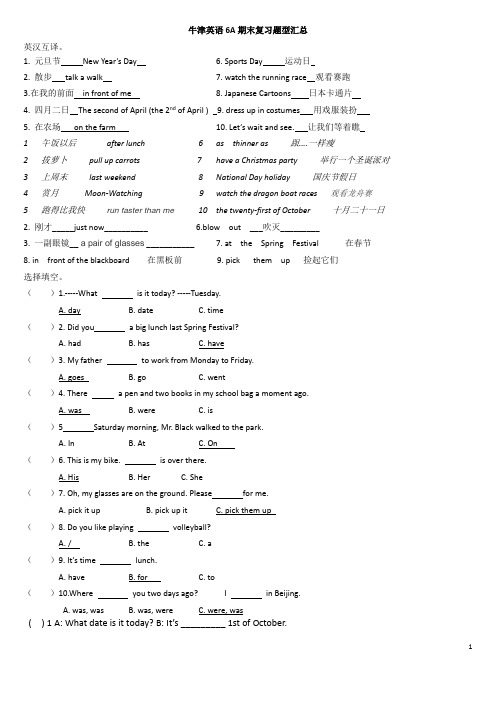
牛津英语6A期末复习题型汇总英汉互译。
1. 元旦节New Year’s Day 6. Sports Day 运动日2. 散步talk a walk 7. watch the running race 观看赛跑3.在我的前面in front of me 8. Japanese Cartoons 日本卡通片4. 四月二日The second of April (the 2nd of April ) 9. dress up in costumes 用戏服装扮5. 在农场on the farm 10. Let’s wait and see.让我们等着瞧1 午饭以后after lunch 6 as thinner as 跟....一样瘦2 拔萝卜pull up carrots 7 have a Christmas party 举行一个圣诞派对3 上周末last weekend 8 National Day holiday 国庆节假日4 赏月Moon-Watching 9 watch the dragon boat races 观看龙舟赛5 跑得比我快run faster than me 10 the twenty-first of October 十月二十一日2. 刚才_____just now__________ 6.blow out ___吹灭_________3. 一副眼镜__ a pair of glasses ___________ 7. at the Spring Festival 在春节8. in front of the blackboard 在黑板前9. pick them up 捡起它们选择填空。
()1.-----What is it today? -----Tuesday.A. dayB. dateC. time()2. Did you a big lunch last Spring Festival?A. hadB. hasC. have()3. My father to work from Monday to Friday.A. goesB. goC. went()4. There a pen and two books in my school bag a moment ago.A. wasB. wereC. is()5 Saturday morning, Mr. Black walked to the park.A. InB. AtC. On()6. This is my bike. is over there.A. HisB. HerC. She()7. Oh, my glasses are on the ground. Please for me.A. pick it upB. pick up itC. pick them up()8. Do you like playing volleyball?A. /B. theC. a()9. It’s time lunch.A. haveB. forC. to()10.Where you two days ago? I in Beijing.A. was, wasB. was, wereC. were, was( ) 1 A: What date is it today? B: It’s _________ 1st of October.A. aB. /C. anD. the( ) 2 What holiday _______ after May Day?A. comeB. comesC. comingD. came( ) 3 That girl _____ her grandma and her grandpa last Friday.A. visitB. visitsC. visitedD. visiting( ) 4 _______ ate many noodles last Sunday.A. Mike and IB. I and MikeC. I and mikeD. Me and Mike( ) 5 A: What ______ you do? We flew the kites. 【flew fly的过去式】A. didB. doC. doesD. don’t( ) 6 Jim and Ben are _____ about Be n’s birthday.A. talkB. sayingC. speakingD. talking( ) 7 Where are my shoes? _______.A. It’s on the desk.B. It’s under the deskC. They’re under the desk.D. It’s here.( ) 8 I t is an _____ day, we are all ______.A. excited, excitingB. exciting, excitingC. exciting, excitedD. excited, excited( ) 9 We usually _______ moon cakes at Mid-Autumn Festival.A. eatB. eatedC. ateD. eats( ) 10 Whose book is it? It’s not _____ book. It’s _____.A. my. herB. mine, hersC. mine, herD. my, hers选择题。
- 1、下载文档前请自行甄别文档内容的完整性,平台不提供额外的编辑、内容补充、找答案等附加服务。
- 2、"仅部分预览"的文档,不可在线预览部分如存在完整性等问题,可反馈申请退款(可完整预览的文档不适用该条件!)。
- 3、如文档侵犯您的权益,请联系客服反馈,我们会尽快为您处理(人工客服工作时间:9:00-18:30)。
more(many、much 共同的比较级)+可数名词、不可数名词
You should have less meat, fewer soft drinks and do more exercise.
其他
a slice of /slices of;a tin of/ tins of;a bag of/ bags of;a piece of/ pieces of
时间表达方式
日期
9月9日的表达:on the tenth of September 或 on September tenth
几点钟
2点15分:two fifteen =a quarter past two
3点10分:three ten = ten past three
1点半:one thirty = half past one
副词
副词
表示动作特征或性状特征,一般用来形容或修饰形容词、动词、其他副词和句子。
用法
修饰形容词:He looks very happy.
修饰动词:The old lady is walking slowly now.
修饰句子:Luckily, he got the first prize.
次数副词
一次once, 两次twice, 三次及以上: 数字+times
I spend two yuan on this pen.=I spend two yuan in buying this pen.
表示提议的句型
Shall we
Shall 是情态动词+接动词原形
Shall we have a picnic tomorrow?
Let’s
+接动词原形
Let’s have a picnic tomorrow
将来时
一般将来时
表示将来某时发生的动作或状态,常与 tomorrow/next +时间词/in+一段时间/in the future连用
构成
will/shall +动词原型
I will meet them at the entrance.
is/am/are going to +动词原形
They are going to go fishing tomorrow.
数词、量词
a few
只能修饰可数名词,与可数名词的复数形式连用,a feweggs.
a little
只能修饰不可数名词,a little milk.
some
a lot ofplenty of
既可修饰可数名词又可修饰不可数名词。当与可数名词连用时,只能与可数名词的复数形式连用
someeggs. a lot of milk.Plenty of eggs.
连词
连词
用于连接两个简单句
and
or
连接肯定句中的平行并列关系
Some
any
some用在肯定句中,any用于否定和疑问句中。
I have some new books. Do you have any new books? I don’t have any new books.
too many
too much
too fewtoo little
too many +可数名词复数Too many sweets are bad for your teeth.
How much does it cost? It cost (me) 5 yuan.
take
花时间
主语为it
It takes sb. some time to do sth.It takes me 10 minutes to go to school.
spend
花钱/时间
主语为人
Spend time/money on sth.spend time/money in doing sth.
问时间
When
Whendoyou go to school every day?
问频率
Howoften
How often do you go swimming?Usually,I go swimming twice a week.
问数量
How many
How much
How many+可数名词的复数形式。How many uncles do you have?
必须、很重要或必要不准,不允许或禁止
Wemust study hard.
You mustn’t leave school alone.
提问
把情态动词单独提前
Must we wait foryou?Yes,youmust ; No, youneedn’t.(非mustn’t)
花钱花时间
cost
花钱
主语为物
too much +不可数名词Don’t drink too much cola.
too few +可数名词复数you eat too few eggs.
too little+不可数名词You eat too little fruit.
fewer
less
more
fewer(few的比较级)+不可数名词
现在完成时
构成:have/has +动词的过去分词
(1)表示动作发生在过去,对现在有影响。I haveread this book three times.
(2)表示从过去某一时间开始到现在一直在做某事。I havebeen in CHINA for three years.
用法
have/has been to 去过/到过 (现在已经回来)have/has gone to 去/到(表示现在还没有回来)
错误
She is always helps other people.(×) 一句话中不能同时出现两个动词。
区别
how often
how many times
问“频率次数+时间范围” How often do you exercise? —Twice a week.
问”次数” How many times have you been there?
a quarter of 四分之一three quarters of 四分之三
交通工具
bybus/bike/car/underground/train/ferryHe goes to school by bus.
take a bus/car/underground/train/ferryHe takes a bus to school.
AB两地不相邻
A is north B.Beijing is north Nanjing.
AB两地接壤
A is on thenorth of B.Heilongjiang is on thenorth ofJilin..
A包含B, B属于A
B is in the north of A.Beijing is in the north of China.
表示具体的某一天用介词on。On Sunday,On Sunday morning,On the Open Day.
the oneonthe left/right,the oneinthe middle=the left/right/middle one.
地点、方位表述
near 离**近
far (away) from离**(很)远
代词one 用来指代一个人或事物,而 ones 用来指代一些人或事物。
定冠词 the用法:
在球类运动前不加定冠词
play football / basketball / tennis,
在乐器前必须加定冠词
play the piano / violin,
在球类运动前不加定冠词
watching television
getto school.到达那里”只能说 get there
reach 到达+某地
reach school
Leave 离开+某地
He will leave Shanghai.
方位词:
方位词
east / west / north / south / north-east / north-west / south-east / south-west
情态动词
情态动词是表示说话人情绪,态度或语气的动词,不能单独作谓语,要和其他动词原形构成谓语。包括can (could), may (might), must, need, ought to, dare (dared), shall (should), will (would) 。
must
must not
疑问句
问内容
What
What does this sign mean?What kind of soup/fruit would you like?
问原因
Why
Whydo you likeapple juice?I likeapple juicebecause….
问地点
Where
Wheredowe go?
She has been to JAPAN.(她去过日本)She has gone to JAPAN. (她去日本了)
have/has been in = have lived/ stayed in一直住在
I have been in CHINA for three years.=I havelived in CHINA for three years.
